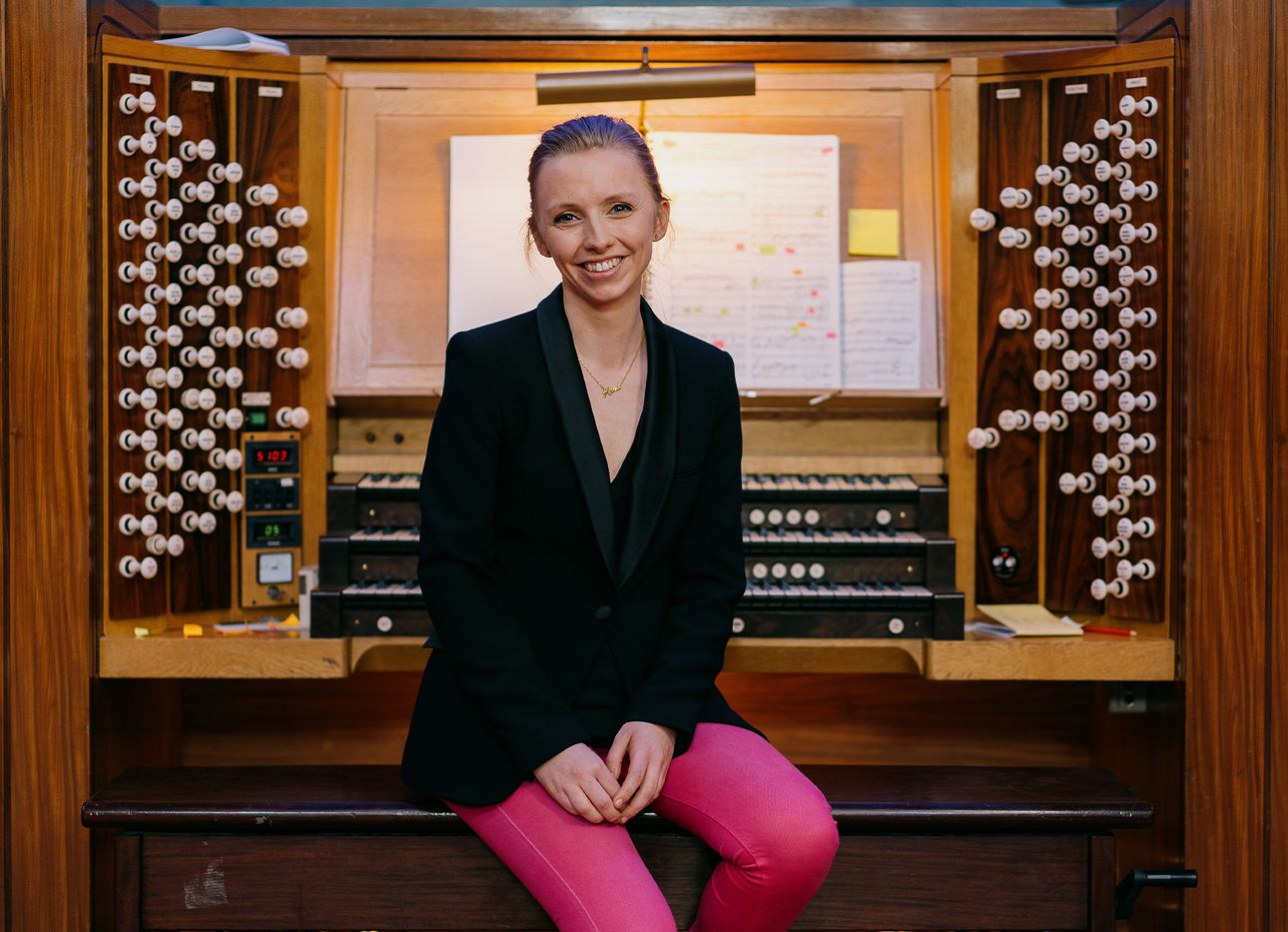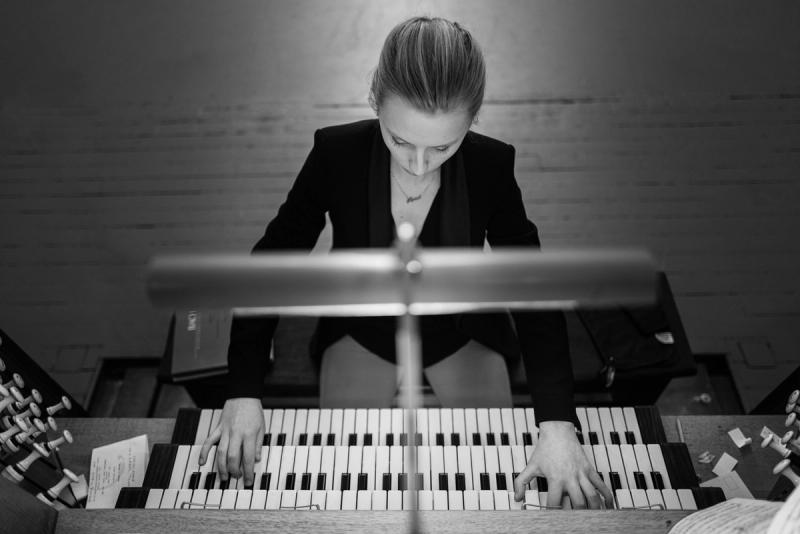
How a Master Organist is Making the Archaic Instrument Cool Again
The organ often shocks by the strength of its scale alone. Few other instruments, after all, can be so large as to necessitate being woven into the very architecture of the building that holds them. While its grandeur might be intimidating, conductor and organist Anna Lapwood is looking to change that. Taking up the organ at the age of 15, she quickly mastered the instrument, becoming the first woman to receive one of the prestigious Organ Scholarships from Oxford’s Magdalen College in its 560-year history and, shortly thereafter, at age 21, becoming director of music for Pembroke College, Cambridge, the youngest ever to hold such a position within an Oxbridge college.
While rigorously following in the organ’s classical traditions, Lapwood has adamantly worked to modernize both the perception of the instrument and the culture surrounding it. Using social media, she’s trying to get younger people interested in the organ, making particularly pronounced use of TikTok, where videos of her performing everything from Bach to the Interstellar soundtrack have garnered views into the millions. She’s also working to fight the historic gender imbalance among those performing the instrument, establishing programs such as the Cambridge Organ Experience for Girls, staging events including a 24-hour Bach marathon performed by a team of all women, and, in general, leading by example as one of the most highly visible and accomplished organists playing today.

How did your journey as an organist begin? What drew you to the instrument?
I was actually a harpist before. I was pretty set on being a harpist. I had basically decided that that was what I wanted to do as a teenager. Then, I remember my mom saying to me, “Have you thought about taking up the organ?” I did the whole, quite teenage, “Oh, don’t be ridiculous mom, the organ is awful. I hate the organ.” She said, “Well, if you were to get the organ scholarship from Oxford or Cambridge, the organ scholars get grand pianos in their rooms.” That was the thing that made me think, Hold on a minute. Maybe the organ isn’t so bad after all. I ended up falling in love with the instrument.
Did you fall in love with it right away?
No, it took a while. I’d learned piano by that point, and I’d learned harp and violin, but I was stuck on grade three organ because you have to retrain your brain a little bit. You have to sever the tie between your left hand and your feet, and it takes a long time to do that. So I was really frustrated at first that I couldn’t speak eloquently, in musical terms, on the organ in the way that I’d gotten used to with other instruments. But I think, in a way, that sort of pushed me to take it more seriously because I really wanted to conquer it.
How does the sense of touch play into your relationship with the instrument and your performances?
One of the fascinating things about organs is that you could be playing an instrument which has been sitting in a church for a hundred years. The organ I play regularly at Pembroke was originally built in 1710, and the instrument has quirks that date back to that time. For instance, the keys dip in the middle from the years of wear from people touching the keys. So when you play it, you feel like you’re somehow touching history.
Also, from a touch perspective, every organ is different. For example, on the organ in the [Royal] Albert Hall, the keys kind of heat up under the lights. They hum and vibrate under your fingers when you play. So it feels, on that organ, that you’re dealing with a living thing. It feels like a living, breathing instrument as opposed to just playing a machine.
There’s one other thing: our feet. Organists rely almost entirely on touch over sight, because you don’t really have time to look at your feet while playing. You have to rely on your feet and trust that you’ll feel the right notes underneath them.
Do you have a personal favorite organ to perform with?
At the moment, my favorite is the [Royal] Albert Hall organ because I’m spending quite a lot of time there, and it’s quite a monumental space. It feels like there’s a little bit of magic that happens every time you’re performing in that building. It’s a huge instrument with all of these different colors it can hold at once. There’s something special about having the time to get to know an individual instrument really well. Doing repeat performances in the same place, spending hours there into the night, getting used to the character of that instrument—as opposed to just going in, doing a concert, and then moving onto the next one.
What do you feel is the organ’s significance today?
I’m hoping it’s changing. I think it has faced a bit of—not an identity crisis—but an exception crisis in recent years. As society becomes increasingly secular, and people aren’t going to church anymore in the way they used to, people associate the organ with that world and think that it’s not something for them.
But actually, it’s an instrument with a history outside of the church as well. It exists in the concert hall. It exists at football matches. Certainly part of what I’m trying to do is to take it out of the church, in a way. I want to play music that people will recognize from other areas, like film soundtracks—things that make the instrument relevant. Presenting the instrument that way, I’ve yet to find anyone who doesn’t like it. There’s nothing not to like.
What are you doing to try to get more people to see the instrument this way?
Social media has been a big way in which I’m trying to bring it to a younger audience. I’m very much of the view that we can’t expect them to come to us, but we can very easily take it to them. I’m trying to make the organ something they stumble across, and they’ll often stumble across it if I’m playing music from something they recognize from their everyday life. Then they click through and see everything else I’ve played, and get drawn into the slightly more, perhaps, serious side of the organ.
I saw the video of you playing the Interstellar soundtrack, and it did a great job of showing that the organ doesn’t stand outside of secular culture, it just might be there in less detectable ways.
Exactly. When I posted that video, loads of people were saying, “I didn’t realize that the organ was playing that originally.” They thought it was a piano and synthesizer. When people aren’t used to hearing the organ itself a lot, it can be unfamiliar when they hear it. What I was trying to show was how much the organ has infiltrated non-classical culture already, but just subtly, under the radar.
What kind of piece do you enjoy performing the most?
It changes every day of the week, depending on what I’m working on at the moment, and depending on what mood I’m in. I tend to go through phases where I get really obsessed with one thing, and then have to take a break from it for about a year. One of my obsessions at the moment is Bach’s “Prelude and Fugue in A minor.” It feels like you’re flying when you play it, and you can play around with ornamentation to make it fun. The other one I’ve been playing quite a lot of at the moment is the How to Train Your Dragon soundtrack, so the polar opposite. It’s what I play whenever anyone says, “Show me what the organ can do.” Again, just seeing people react with surprise and excitement and enthusiasm to the instrument when they hear something they recognize… It’s really, really special.